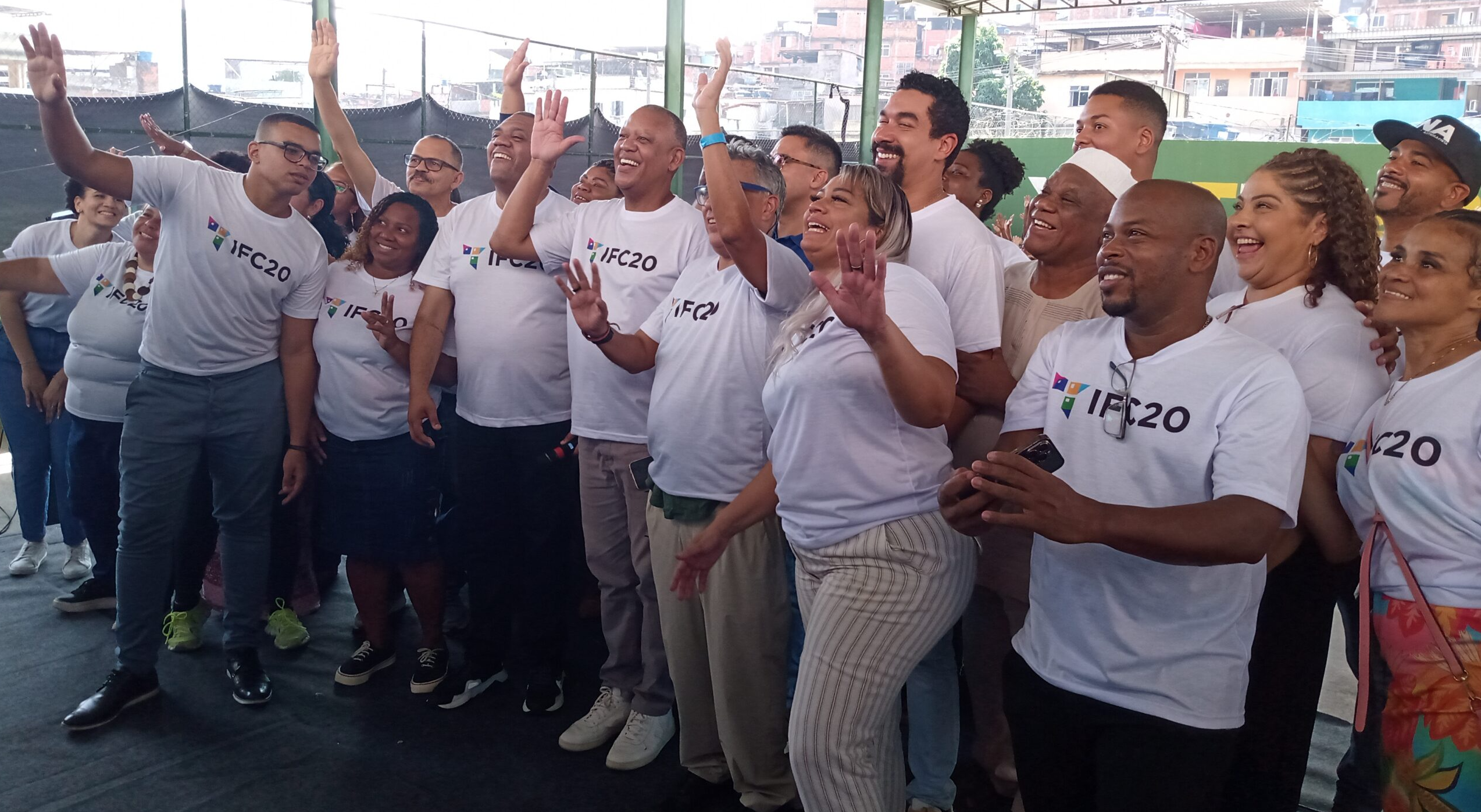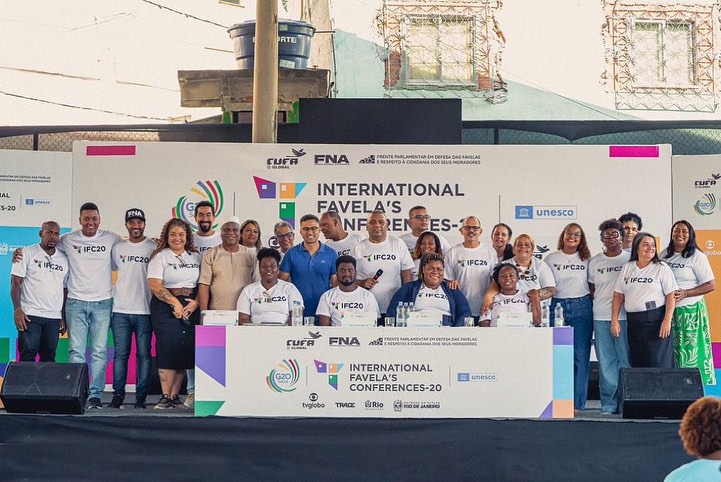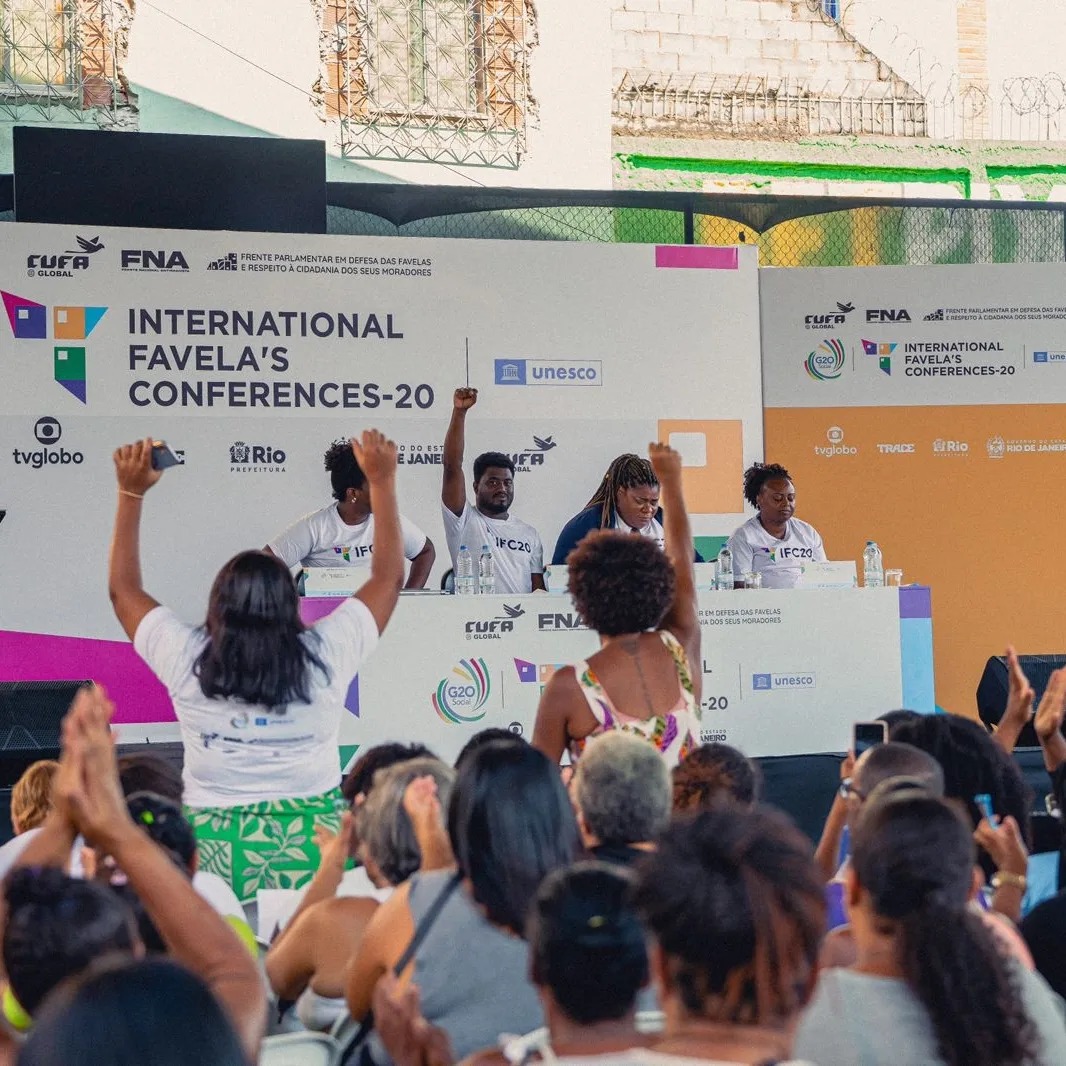
The 1st International Favelas’ Conference (IFC20) was held at the Central Única de Favelas (CUFA) headquarters in Complexo da Penha, in the North Zone of Rio de Janeiro, on Monday, April 29. A collaborative effort by CUFA, the National Anti-racist Front (FNA), and the Favelas Parliamentary Front, the initiative aims to gather the demands of the favelas of Brazil and 40 other countries. Proposals from the conference will be delivered at the G20 Summit, scheduled for November 2024 in Rio de Janeiro, and attended by global leaders. The IFC20 is held in partnership with UNESCO and endorsed by G20 Social.

Representatives from the favelas, state and municipal entities, and civil society organizations were present at the conference opening. Among them were: Ivanir dos Santos, professor, PhD, and babalawo—a high priest in the afro-Brazilian Candomblé religion; Adriana Martins, member of the Terra da Benção Association, in Favela do Chapadão; Bruno Batista, CEO of Trace Brazil; members of the Favela Front Brazil; Henrique Silveira, from the Rio de Janeiro City Hall Pereira Passos Institute (IPP); George Patiño, journalist and communications assistant at Unesco; Diego Zeidan, from the Municipal Secretariat of Solidarity Economic Development; Karol Mendez and Carol Felix, from the State Women’s Secretariat; Jéssica Ohana, special advisor to the Governor’s Office; Ruth Jurberg, from the State Secreteriat of the Chief of Staff and Integrated City Program; Allan Borges, an executive from Rio’s sewage and water utility CEDAE; Appellate Judge Siro Darlan; Raul Ruan, advisor to the State Secretariat of Culture and Creative Economy; Aline Gomes and Ronald Pessanha, from Globo TV.
The opening ceremony was kicked off by the national president of CUFA, Preto Zezé, who was accompanied by: Elaine Caccavo, vice president of CUFA; Alessandra Vieira, better known as Sandra Vieira, coordinator of CUFA in Complexo da Penha, and Gê Coelho, a member of the National Anti-Racist Front (FNA). A sequence of very powerful speeches then followed, engaging the audience from the favelas of Rio de Janeiro gathered in Penha.

Vieira explained that the creation of this space for dialogue is an achievement, one aimed at initiating a more attentive and active listening of what is on the agendas of favelas and their leaders, and expanding their reach. The proposal is to narrow the communication gap between institutions and residents, bringing together agendas and solutions from Rio’s favelas.
“I’m very proud to lead Complexo da Penha, it’s a great honor for me to manage this space, to contribute. And now we have yet another reason to be proud, which is the opportunity to have a voice. Voices from the favela will be heard globally at the G20. We will have the chance to visit 41 countries, starting here in Brazil. The starting point is crucial.” — Sandra Vieira
The vice president of CUFA, Elaine Caccavo, also emphasized the unprecedented nature of the initiative. She stressed the importance of the topics chosen coming directly from the favela community and underscored this as a means of changing practices that dehumanize those who experience life in the favelas. “May we stop being lab rats. It’s time for us to break away from this logic.” Meanwhile, the member of the FNA, Gê Coelho, highlighted the event in Penha as symbolic.
“This is a historic milestone. We need to realize how important this day, today, is for Black people, for favela residents. If we stop and think about the topics, when we talk about social inequality, it affects both Black people and favela residents. When we think about sustainability and, for instance, environmental racism, where does it impact the most? Here in the favela territory. If we’re going to discuss human rights, then, we don’t even need to think that much! Where do we have Black bodies being executed? Within the space and territory of the favela. We’re taking the favela and the Black people’s agenda to the G20. We are going to visit every favela in Brazil. We will then travel the world and bring about transformation with these demands.” — Gê Coelho


Preto Zezé explained that the choice of audience present at the event stemmed from the strategy of demystifying the subject matter for the public and giving the popular wisdom of the territories the appreciation it deserves.
“We decided to take a different approach. Usually, it’s the more organized movements that go to conferences. We needed to get ahold of the disorganized and bring the conferences to the favela. That was a first point. And that included those who don’t even know what the heck a conference is and what it’s for. A conference is a gathering of our interests, of our daily lives. We made an effort so that many people who don’t have the means to be here today could come, listen, and take in what residents of other favelas produce every day. And we want to do this in 41 countries as well.” — Preto Zezé
Besides the unprecedented event, the president of CUFA also announced the pre-launch of Favela 30, in partnership with the Government of the State of Pará. The project will take place next year, following the agenda of COP 30, a meeting of world leaders in Belém do Pará to discuss environmental issues.
“These environmental issues involve discussing the Amazon wildfires and what’s happening with these pesticide problems. But environmental issues are also linked to the time we spend on the bus, the type of food we eat, the lack of access to water and basic sanitation, the quality of housing, the division of land space in the city, and so on. So, environmental issues are integrally linked to our daily lives, although it may seem, quite often, that when we talk about [the favela], the only thing we fear is flooding.” — Preto Zezé

Thematic Discussions
About 500 participants divided into four thematic axes to be debated, namely: 1. Reduction of Inequalities, Fighting Hunger and Poverty; 2. Sustainability; 3. Human Rights, Race and Gender; 4. Global Challenges Faced by Favelas and Peripheries. In each nucleus, the highest priority agendas were discussed and compiled.
The Reduction of Inequalities, Fighting Hunger and Poverty axis discussed investments in health and education, professional training, tuition-free university education, job creation and food waste as a resource for food security in favelas. The Sustainability axis included proposals on solid waste management and plastic-free favelas, social engagement and waste as a source of income. The Human Rights, Race and Gender axis encompassed access to in-person human rights information, professional training for residents for higher-paying jobs, and making human rights a mandatory subject in schools. The axis focused on Global Challenges Faced by Favelas and Peripheries included topics such as: access to effective public policies, particularly in the areas of education, leisure, sports, health, food security, and public security, access to jobs and income, more investments and support for the “Young Apprentice” program; and empowerment of favela residents, actions against intolerance, religious racism, and LGBTQIAPN+phobia in favelas and peripheral areas.
Representatives from each group were chosen to announce the most important consensuses of each thematic axis: Andrea Martins, Vinícius Augusto, Vanessa Silva, and Miriam Nascimento, all of them favela residents.
“If we don’t take care of the environment today, there won’t be a tomorrow to be taken care of. Based on that, we would like to invite, and also create, cooperatives and companies to deal with recycling because the waste that’s inside the favela is money. But when waste is not taken care of, what happens? A catastrophe… Let’s join hands to have a much more sustainable world.” — Vinícius Augusto
Vanessa Santos emphasized the importance of the State investing in the infrastructure that already exists in the favelas, especially those available through local social, health, and social welfare initiatives.
“Investment in the projects we already have, in health and education, such as the SISREG [the Ministry of Health’s Appointment Regulation System], SUS [Brazil’s Unified Health System], CadÚnico [the federal government’s Unified Registry program], Cras [Social Assistance Reference Centers—most families’ entry point into all social welfare programs], Creas [Specialized Social Assistance Reference Centers]. It’s really just a matter of taking these existing programs and making them work. Why spend money to make something new? Isn’t it better to use what you already have and make it work perfectly? Because there are people, families we know, who need SUS and it doesn’t work. So, instead of spending money to create something new, let’s start by fixing what we already have.”
The speaker, a former inmate, advocates for the need to expand and facilitate job opportunities for individuals transitioning out of the prison system. “Are we looking out for those who are former inmates and no longer want to cause trouble? Are we looking out for those who want to leave the drug trade but can’t? Only those who have lived through it truly understand what hunger is.”
She emphasized the importance of empowering and supporting those who wish to distance themselves from crime and build a new life. She shared her personal experience as an example of resilience and rehabilitation. Additionally, she advocated for the training of women to manage projects aimed at combating food waste and highlighted the potential of this initiative for generating employment, income, courses, community development, and food security.
In relation to the discussions of the Human Rights, Race, and Gender axis, Miriam Nascimento Santos commented:
“If I ask [people] here what human rights are, many won’t know what to say. Because we only hear about it on television, we hear about it on social media, but when it comes to finding out what our rights are, we lack information… we need to have access to information through lectures and events in our community, through our associations… we need training for people in our community… There are many people in our community who have a college degree, many of us who finished high school… if we have courses that can train them, there [in the favela where they live, that would be great]… when you don’t have knowledge, you don’t know your rights.”
For Celso Athayde, founder of CUFA, the initiative is primarily aimed at making world leaders listen to favela residents, their local assets, and strategies for solving their problems. IFC 20 is a first step toward including the favela’s perspective in the international agenda.
“The G20 and the COP are coming to Brazil, and they will be addressing topics such as sustainability and human rights, among others—topics that are relevant within the favela. But the favela is not heard. So, it’s an opportunity to take favelas to discuss issues that actually have a greater impact on them [than on the rest of the city].” — Celso Athayde
Ver essa foto no Instagram
The activities in Penha marked the beginning of a series of conferences that will take place in over 3,000 favelas in Brazil, covering all 27 Brazilian states, and in 41 other countries. These conferences will go on until September 2024 and aim to include the favela in the G20 agenda, gathering contributions from favela residents from all regions of Brazil, the Americas, Europe, Africa, Asia, and Oceania.

The actions of IFC20 are carried out by CUFA offices around the world. These conferences will be divided into phases throughout the months of April, May, June, and July. The first phase will take place in the following countries: Luxembourg, May 6; Sweden, May 8; Russia, May 10; Kazakhstan, May 11; Uzbekistan, May 12; Belgium, May 13; England, May 16; Central African Republic, May 18; Democratic Republic of Congo, May 20; and Mozambique, May 23.
About the author: Amanda Baroni Lopes is a journalism student at Unicarioca and was part of the 1st Journalism Laboratory of Maré community newspaper Maré de Notícias. She is the author of the Anti-Harassment Guide on Breaking, a handbook that explains what is and isn’t harassment to the Hip Hop audience and provides guidance on what to do in these situations. Lopes is from Morro do Timbau and currently lives in Vila do João, both favelas within the larger Maré favela complex.
